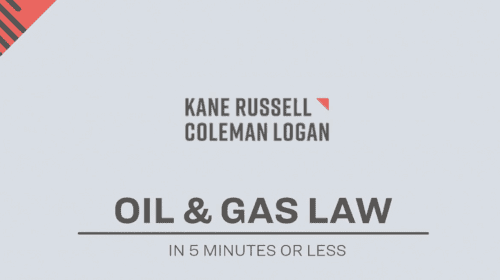In a case that has been closely watched in the oil and gas industry, Lightning Oil Company v. Anadarko E&P Onshore, LLC, the Texas Supreme Court decided in May whether drilling through a mineral estate—one which is not under lease by the driller—to access a reservoir beneath a bordering tract constitutes a form of trespass.
The operator in the case, Anadarko Petroleum, secured permission from the surface owner of a tract adjacent to the company’s leasehold to spud a well and drill directionally into the mineral estate “next door.” The owner of the mineral rights under the surface of the spud site, Lightning Oil, argued that Anadarko trespassed when it bored through Lightning’s mineral estate.
The Texas high court affirmed decisions from the appellate and trial courts that had roundly rejected Lightning’s claims. As the Texas Supreme Court sees it, the surface owner is presumptively the master of “the mass of earth undergirding the surface,” and therefore it alone will usually have the authority to authorize this kind of subsurface activity.
The Court did acknowledge that the appropriate test is nevertheless fact intensive, involving a careful balancing of the competing interests of all the involved parties. The fundamental inquiry will be the extent to which the horizontal drilling will cause the unleased mineral owner to suffer a loss of oil and gas. In Lightning’s case, only a “small amount of minerals [was] lost through that process,” and, according to the justices, this is not enough to rise to the level of mineral trespass.
In that context, we have no doubt that individual interests in the oil and gas lost through being brought to the surface as part of drilling a well are outweighed by the interests of the industry as a whole and society in maximizing oil and gas recovery. That being so, we conclude that the loss of minerals Lightning will suffer by a well being drilled through its mineral estate is not a sufficient injury to support a claim for trespass. Accordingly, such a loss will not support injunctive relief.
Lightning also argued that, even if Anadarko’s existing well had not caused it to suffer substantial harm, the operator’s slate of proposed wells would prejudice Lightning’s ability to produce its minerals in the future. This, according to Lightning, would result in precisely the kind of irreparable harm that would support the entry of an injunction against Anadarko. The Court was unimpressed with this argument because Lightning had adduced virtually no evidence of such harm. On this score, Justice Phil Johnson, writing for an undivided Court, was direct and to the point: “Speculation is not enough.”
On the heels of its opinion in Lightning, the Texas Supreme Court issued another watershed decision with sweeping implications for the oil and gas industry. In Davis v. Mueller, the Court decided an appeal that challenged, as ambiguous, a mineral conveyance that had been made on a county-wide basis (in other words, a mineral deed providing for the transfer of all the seller’s oil and gas interests in a specific county).
When the Court heard oral arguments in March, industry observers were concerned. After all, to the extent it was held that all-encompassing, county-wide conveyances are invalid as a matter of law, the floodgates would open and unleash a torrent of mineral title litigation. Indeed, as it was argued to the Texas Supreme Court earlier this year, if blunderbuss mineral conveyances were invalidated as ambiguous, we would expect to see small armies of landmen descend on courthouses across the state. All of them would be tasked to pour over deed records to isolate just these kinds of conveyances, and then to obtain mineral leases from those who might have claims to the minerals under the changed law. Naturally, this would wreak havoc on operators that spent millions of dollars developing big plays, only to be confronted with the possibility that entire mineral leaseholds are invalid.
Mercifully, the Texas Supreme Court reached the correct decision and came to the common-sense conclusion that county-wide mineral deeds are valid and enforceable. Leaving no room for doubt, Chief Justice Nathan Hecht wrote that, on its face, a county-wide conveyance “could not be clearer.” Justice Hecht then added, simply enough, that “all means all.”
Tom is a litigation partner in the Houston office of Kane Russell Coleman Logan PC, where he serves as the head of the firm’s energy practice group. Tom is also the host of a weekly podcast on legal news and developments in the oil-and-gas industry, available at www.energylawroundup.com, and a video series on effective legal writing, available at www.theartofthebrief.com.
Tom is a litigation partner in the Houston office of Kane Russell Coleman Logan PC, where he serves as the head of the firm’s energy practice group. Tom is also the host of a weekly podcast on legal news and developments in the oil-and-gas industry, available at www.energylawroundup.com, and a video series on effective legal writing, available at www.theartofthebrief.com.












